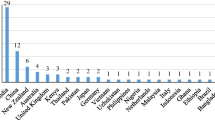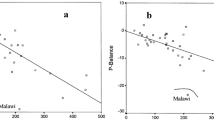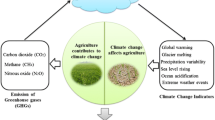Abstract
Agriculture is considered as the backbone of the economy of Pakistan. However, current changes in climate have been adversely affecting agricultural productivity. In this paper, perceived impacts of climate change on agriculture and adaptation towards it have been studied in Charsadda district (lowlands) of Khyber Pakhtunkhwa province of Pakistan through extensive field surveys, involving 116 farm households. Results have revealed that climate change factors including fluctuating temperature, evidence of yearly long droughts, and a steady shift in rainfall patterns have pressured the agriculture sector and livelihoods of the local peasants. The staggering floods of 2010 and 2011 in Pakistan have evidenced severe climatic changes in Pakistan. These countrywide floods have washed fertile soil in the study area that has directly contributed to losses in agricultural yield and increased vector-borne diseases in crops. The local farmers have commonly deployed adaptive measure such as crops diversification, changing fertilizer, and planting shaded trees to minimize the impacts of changes in climate. However, these adjustments measures are perceived as not appropriate for improving farm yield. Therefore, the study suggests that improved understanding of the climate change impacts and knowledge on adapting adequately will lead to no-regret adaptation. It will also help protecting farmer’s lives and livelihoods and will boost their resilience towards changing climatic conditions.

.







Similar content being viewed by others
References
Abbass, Z. (2009). Climate change, poverty and environmental crisis in the disaster-prone areas of Pakistan. Oxfam Policy and Practice: Climate Change and Research, 5(3), 1–96.
Abid, M., Scheffran, J., Schneider, U. A., & Ashfaq, M. (2015). Farmers’ perceptions of and adaptation strategies for climate change and their determinants: The case of Punjab Province, Pakistan. Earth System Dynamics, 6(1), 225–243.
Abid, M., Schilling, J., Scheffran, J., & Zulfiqar, F. (2016). Climate change vulnerability, adaptation and risk perceptions at farm level in Punjab, Pakistan. Science of the Total Environment, 547, 447–460.
Adger, W. N., Huq, S., Brown, K., Conway, D., & Hulme, M. (2003). Adaptation to climate change in the developing world. Progress in Development Studies, 3, 179–195.
Ali, A., & Erenstein, O. (2017). Assessing farmer use of climate change adaptation practices and impacts on food security and poverty in Pakistan. Climate Risk Management, 16, 183–194. https://doi.org/10.1016/j.crm.2016.12.001.
Anita, W., Dominic, M., & Neil, A. (2010). Climate change and agriculture impacts, adaptation and mitigation: Impacts, adaptation and mitigation (p. 136). OECD Publishing.
Arbuckle, J. G., Hobbs, J., Loy, A., Morton, L. W., Prokopy, L., & Tyndall, J. (2014). Understanding farmer perspectives on climate change: toward effective communication strategies for adaptation and mitigation in the corn belt. Journal of Soil and Water Conservation, 69(6), 505–516.
Atta-ur-Rahman, & Khan, A. M. (2013). Analysis of 2010 flood causes, nature and magnitude in the Khyber Pakhtunkhwa, Pakistan. Natural Hazards, 66(2), 887–904.
CERD-EM-DAT (Centre for Research on the Epidemiology of Disasters-Emergency Disaster Database). (2016). Available on http://www.emdat.be/natural-disasters-trends. Accessed on September 2016.
Chaudry, A. Z. (2017). Climate change profile of Pakistan (pp. 1–128). Manila: Asian Development Bank (ADB). https://doi.org/10.22617/TCS178761.
Deressa, T. T., Hassan, R. M., Ringler, C., Alemu, T., & Yesuf, M. (2009). Determinants of farmers’ choice of adaptation methods to climate change in the Nile Basin of Ethiopia. Global Environmental Change, 19(2), 248–255.
Eid, H. M., El-Marsafawy, S. M., & Ouda, S. A. (2007). Assessing the economic impacts of climate change on agriculture in Egypt: a Ricardian approach. Development research group, sustainable rural and urban development team: The World Bank, policy research working paper 4293.
Ekpoh, I. J. (2010). Adaptation to the impact of climatic variations on agriculture by rural farmers in north-western Nigeria. Journal of Sustainable Development, 3(4), 194.
Elahi, E., Zhang, L., Abid, M., Altangerel, O., Bakhsh, K., Uyanga, B., Ahmed, U. I., & Xinru, H. (2015). Impact of balance use of fertilizers on wheat efficiency in cotton wheat cropping system of Pakistan. International Journal of Agricultural Research, Innovation and Technology, 3, 1470–1474.
Farooqi, A. B., Khan, A. H., & Mir, H. (2005). Climate change perspective in Pakistan. Pakistan Journal of Metrology, 2(3), 11–21.
Harmeling, S. (2011). Global climate risk index 2012: who suffers most from extreme weather events? Weather-related loss events in 2010 and 1991 to 2010. Bonn: Germanwatch e.V.
Hoffmann, U. (2013). Section B: agriculture - a key driver and a major victim of global warming, in: Lead article, in chapter 1, Hoffmann, (pp. 3-5). http://www.census.gov.pk/publications.php. Accessed October, 2016.
Hussain, S. S., & Mudasser, M. (2007). Prospects for wheat production under changing climate in mountain areas of Pakistan–An econometric analysis. Agricultural Systems, 94(2), 494–501.
IPCC (Intergovernmental Panel on Climate Change). (2007). Climate change 2007: The physical science basis. Contribution of work group i to the fourth assessment report of the intergovernmental panel on climate. United Kingdom: Cambridge University Press.
Javed, S. (2016). A study on Pakistan’s vulnerability to climate change, current policies and institutional set-up for dealing with it. Master’s thesis, Norwegian University of Life Sciences, Norway.
Khan, M. A., Khan, J. A., Ali, Z., Ahmad, I., & Ahmad, M. N. (2016). The challenge of climate change and policy response in Pakistan. Environment and Earth Science, 75(5), 1–16.
Kurukulasuriya, P., & Rosenthal, S. (2003). Climate change and agriculture: a review of impacts and adaptations World Bank climate change series paper no. 91. Paper prepared and published for the rural development group and environment department of the World Bank 106.
Lebel, P., Whangchai, N., Chitmanat, C., & Promya, J. (2015). Perceptions of climate-related risks and awareness of climate change of fish cage farmers in northern Thailand. Risk Management, 17, 1–22.
Lucas, M. P., & Pabuayon, I. M. (2011). Risk perceptions, attitudes, and influential factors of rain-fed lowland rice farmers in Ilocos Norte, Philippines. Asian Journal of Agriculture and Development, 8(2), 61–77.
Malik, S. (2012). Case study: Exploring demographic dimensions of flood vulnerability in rural Charsadda, Pakistan. Master thesis: appendix 4, available at: https://assets.publishing.service.gov.uk/media/57a08a65ed915d3cfd000746/Indus_Floods_Research_Appendix_4.pdf.
MoE. (Ministry of Environment). (2009). Climate change vulnerabilities in agriculture in Pakistan. Ministry of Environment, Government of Pakistan, Annual Report. 1-6.
Qasim, S., Khan, A. N., Shrestha, R. P., & Qasim, M. (2015). Risk perception of the people in the flood prone Khyber Pakhtunkhwa province of Pakistan. International Journal of Disaster Risk Reduction, 14, 373–378.
Rasul, G., Mahmood, A., Sadiq, A., & Khan, S. I. (2012). Vulnerability of the Indus Delta to climate change in Pakistan. Pakistan Journal of Metrology, 8(16).
Roncoli, C., Ingram, K., & Kirshen, P. (2001). The costs and risks of coping with drought: Livelihood impacts and farmers responses in Burkina Faso. Climate Research, 19(2), 119–132.
Saif-ur-rehman, S. A., & Shaukat, B. (2013). The effects of 2010 flood on educational institutions and children schooling in Khyber Pakhtunkhwa: a study of Charsadda and Swat Districts. International Journal of Environment Ecology Family and Urban Studies (IJEEFUS), 3(3), 1–12.
Salik, K. M., Ishfaq, S., Saeed, F., Noel, E., & Syed Q. A. (2015). Pakistan: country situation assessment. Islamabad: Sustainable Development Policy Institute Working paper.
Shakoor, U., Saboor, A., Ali, I., & Mohsin, A. Q. (2011). Impact of climate change on agriculture: empirical evidence from arid region. Pakistan Journal of Agricultural Research, 48(4), 327–333.
Sultana, H., & Ali, N. (2006). Vulnerability of wheat production in different climatic zones of Pakistan under climate change scenarios using CSM-CERES-wheat model. In second International Young Scientists’ Global Change Conference, Beijing. 7-9.
Sultana, H., Ali, N., Iqbal, M. M., & Khan, A. M. (2009). Vulnerability and adaptability of wheat production in different climatic zones of Pakistan under climate change scenarios. Climatic Change, 94(1), 123–142.
Ullah, R., Shivakoti, G. P., & Ali, G. (2015). Factors effecting farmers’ risk attitude and risk perceptions: The case of Khyber Pakhtunkhwa, Pakistan. International Journal of Disaster Risk Reduction, 13, 151–157.
Ullah, W., Nihei, T., Nafees, M., Zaman, R., & Ali, M. (2017). Understanding climate change vulnerability, adaptation and risk perceptions at household level in Khyber Pakhtunkhwa, Pakistan. International Journal of Climate Change Strategies and Management, 10(3), 359–378. https://doi.org/10.1108/IJCCSM-02-2017-0038.
Yu, W., Yang, Y. C., Savitsky, A., Brown, C., & Alford, D. (2013). The Indus Basin of Pakistan: the impacts of climate risks on water and agriculture. World Bank Publications https://assets.publishing.service.gov.uk/media/57a08a65ed915d3cfd000746/Indus_Floods_Research_Appendix_4.pdf.
Author information
Authors and Affiliations
Contributions
Takaaki Nihei supervised this research work during doctoral studies of the corresponding author Wahid Ullah. Takaaki Nihei and Muhammad Nafees conceived and designed questionnaires for field survey. Muhammad Nafees and Muhammad Khurshid conducted field survey for data collection; Wahid Ullah analyzed the data; Wahid Ullah, Takkaki Nihei, Muhammad Khurshid, and Muhammad Nafees contributed materials, analysis, and tools; Wahid Ullah, Takkaki Nihei, Muhammad Khurshid, and Muhammad Nafees wrote the paper.
Corresponding author
Ethics declarations
Conflict of interest
The authors declare that they have no conflict of interest.
Additional information
Publisher’s note
Springer Nature remains neutral with regard to jurisdictional claims in published maps and institutional affiliations.
Highlights
• Rural farmers acknowledge changes in climate and consider it as a great threat to their livelihood but often fail to adapt timely and effectively due to economic and technological barriers they face.
• To reduce the negative impacts of climate change, poor rural farmers usually tend to adapt measures that are economically feasible instead of environmentally feasible measures
• Rural farmers have no access to weather- and climate-related information.
• Extension workers and farmers unions poorly operate in our study area, resulting in leaving farmers rely on their limited knowledge on how to cope with the climate change
Rights and permissions
About this article
Cite this article
Ullah, W., Nafees, M., Khurshid, M. et al. Assessing farmers’ perspectives on climate change for effective farm-level adaptation measures in Khyber Pakhtunkhwa, Pakistan. Environ Monit Assess 191, 547 (2019). https://doi.org/10.1007/s10661-019-7651-5
Received:
Accepted:
Published:
DOI: https://doi.org/10.1007/s10661-019-7651-5




